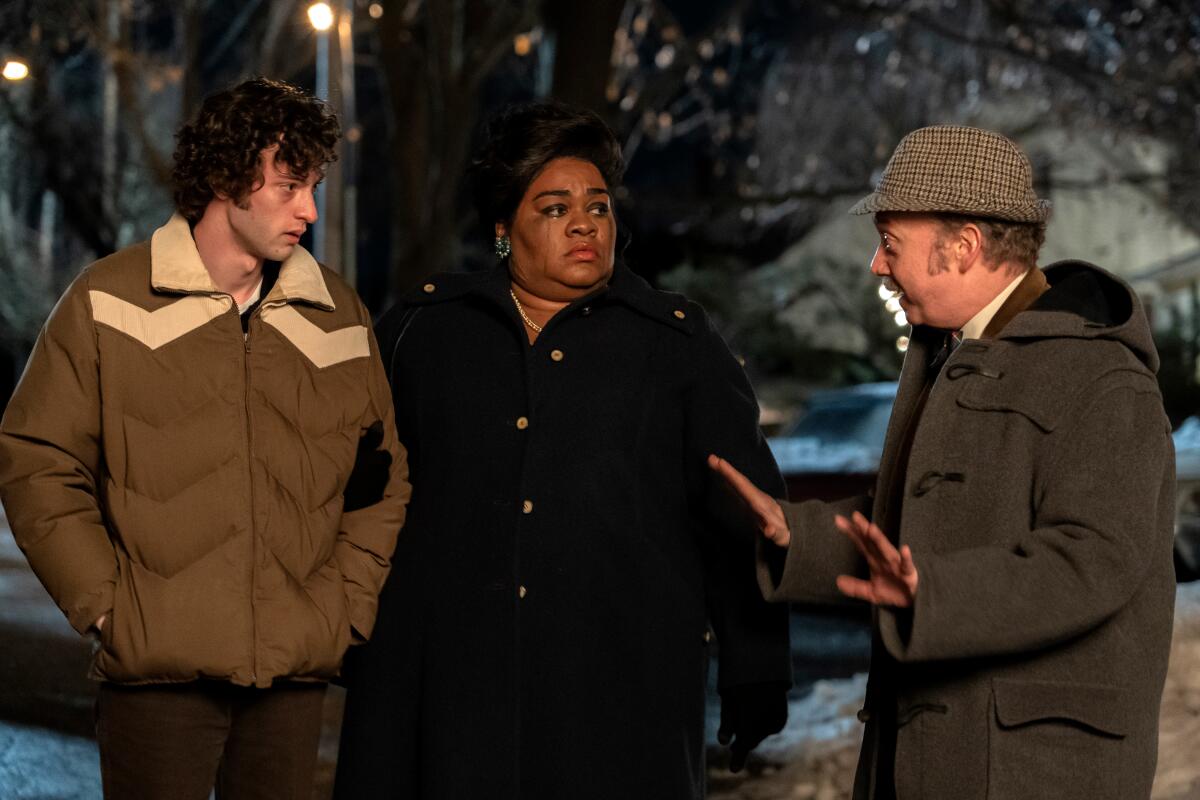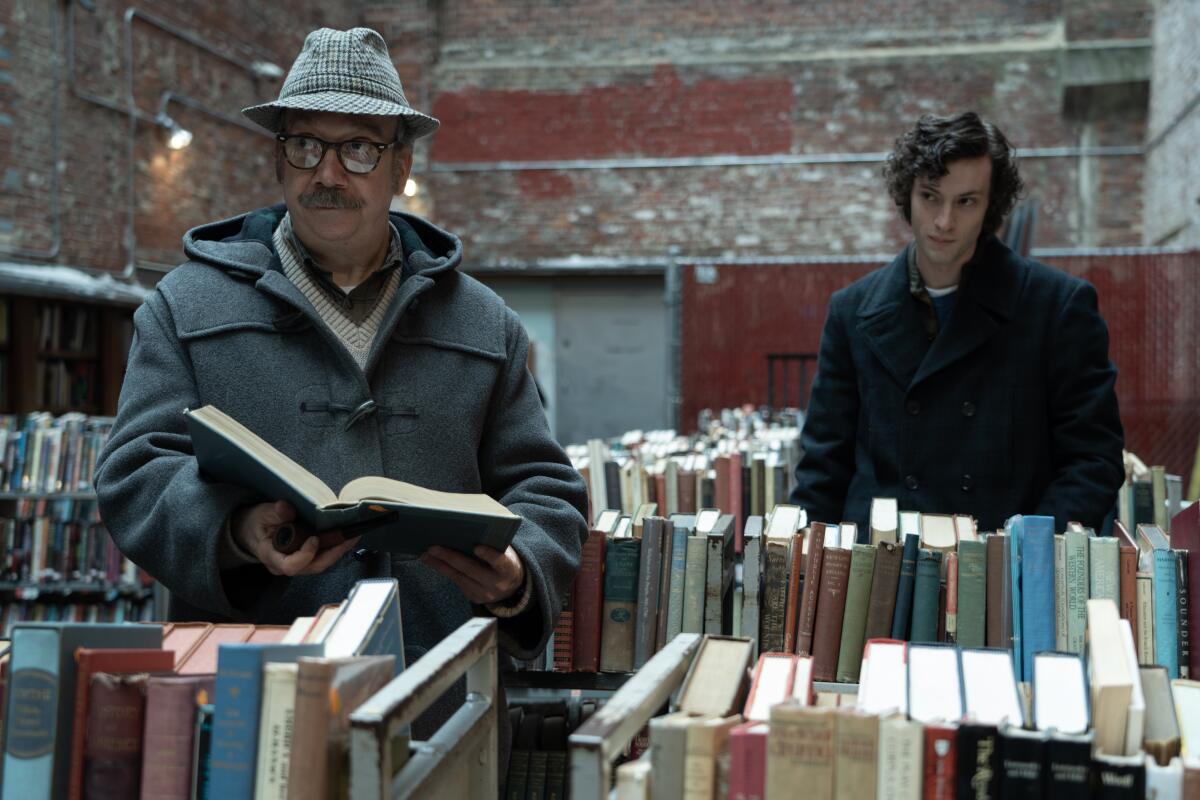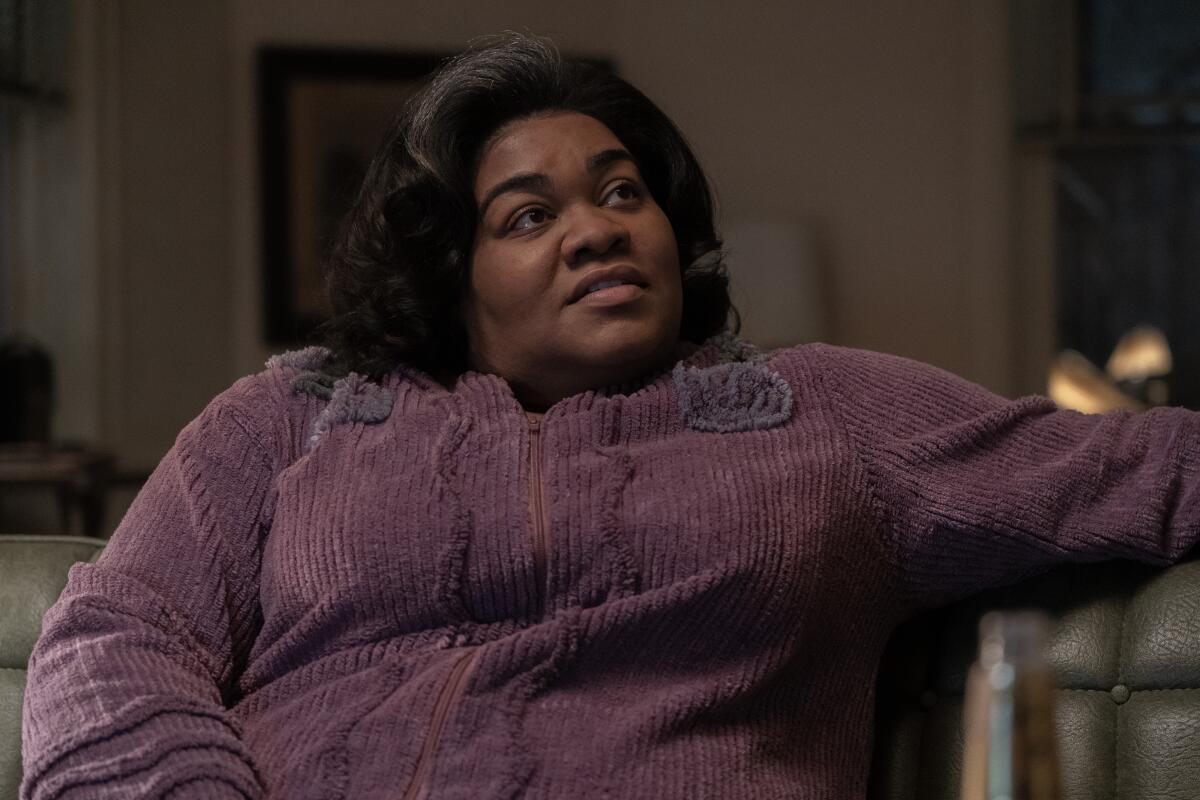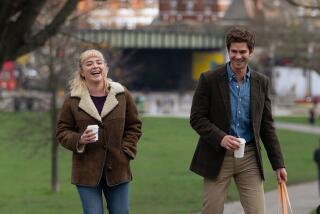Review: Bah, humbug! ‘The Holdovers’ is a clunky, phony white-elephant gift of a movie

Paul Hunham, the eloquent, embittered human wreck played by Paul Giamatti in Alexander Payne’s “The Holdovers,” is a man of many wretched ailments. He suffers from aches, hemorrhoids, lazy eye and trimethylaminuria, a rare genetic condition that causes him to reek of fish. He counteracts this problem, at least inadvertently, by drinking and smoking to excess; surely there’s no odor that whiskey and pipe tobacco can’t partly conceal. Asked about his single worst affliction, though, Paul might point to his young history students at Barton Academy, a New England prep school whose commitment to tradition, discipline and academic rigor he has devoted his life to upholding.
And a good thing too, since in Paul’s own estimation, Barton boys are, with rare exception, a hopeless bunch of “philistines,” “reprobates,” “troglodytes,” “degenerates,” “hormonal vulgarians,” “fetid layabouts” and “snarling Visigoths.” That last jab speaks to Paul’s deep knowledge of ancient civilizations, a field of expertise that he cannot help but bring into casual conversation. Stop and chat with Paul, in other words, and you may walk away bruised of ego, wrinkled of nose and renewed in your determination to know as little as possible about the Peloponnesian War.
But speaking of ancient civilizations: This movie unfolds during the winter of 1970-71, a moment that Payne, making his first period picture, surveys from a wry, self-conscious distance. His choice of time frame supplies some handy sociopolitical scaffolding (the Vietnam War), a few retro stylistic flourishes (an aggressive zoom lens, old-school MPAA and distributor logos, digitally applied scratch marks) and various homages to the questing, adventurous spirit of New Hollywood. As “The Holdovers” morphs from miserablist odd-couple comedy to bittersweet road movie, it aims to remind you, sometimes with a hard nudge, of Hal Ashby classics like “Harold and Maude” and “The Last Detail”; an argument with a waitress automatically nods to Bob Rafelson’s “Five Easy Pieces.” Payne expresses, and seeks to satisfy, a yearning for an earlier ethos of American filmmaking, one that gave precedence to rough-edged characters and real, lived-in human experiences.

Giamatti has long been a specialist in that arena, and here he draws on his mastery of the prickly and irascible to make his fictional namesake a credible, compelling protagonist. He is stymied, at times, by the belligerent comic overstatement of David Hemingson’s script, and also by the nagging predictability of the story’s destination. Still, he embraces Paul Hunham as unconditionally as he did Miles Raymond, the self-lacerating wine lover he played in Payne’s superior 2004 comedy “Sideways.” If director and star were to collaborate again, perhaps with an eye toward completing their own “Erudite Drunk” trilogy, I wouldn’t really complain, though Giamatti’s character certainly would.
The aim of “The Holdovers” is to cure Paul of his misanthropy, at least temporarily, by having him bond with one of his best but also most difficult students. Angus Tully (appealing newcomer Dominic Sessa) is a very smart kid and an inveterate troublemaker, with a history of rebellion and a tongue that’s nearly as sharp and uninhibited as Paul’s. “You’re a f— insecure sociopath,” Angus rails against a class nemesis with whom he soon comes to physical blows. Sometime later, Angus rudely confronts Paul with how bad he smells, how boring his class is and how widely disliked he is by Barton students and faculty.
You can’t entirely blame Angus for lashing out. You would, too, if you were forced to spend winter break at Barton, joining the few unlucky students, or “holdovers,” unable to head home for the holidays. While his mother and new stepfather spend Christmas honeymooning in the Caribbean, Angus is left under the supervision of Paul, who has no family, friends or winter plans to speak of. There are a few other young holdovers, too, though soon the script conveniently sends them packing, leaving Angus alone with Paul and Mary (a terrific Da’Vine Joy Randolph), the school’s cafeteria manager. She’s observing her first Christmas since the loss of her only child, Curtis, a Barton grad who died while serving in Vietnam.

A grumpy professor, a rebellious teen, a mournful cook and a briefly seen custodian (Naheem Garcia), all trapped under one roof for two weeks of frigid isolation, sounds like a promising horror-movie setup: “The Catcher in the Rye” meets “The Shining.” Thankfully, no one gets axed to death in “The Holdovers,” though one character does land in the hospital after a minor accident. There are other off-campus adventures too, including a Christmas Eve party thrown by a friendly Barton colleague (a lovely Carrie Preston) and a surprise “field trip” to Boston. But whatever they do and wherever they go, Paul and Angus always find time to bicker incessantly, reminding themselves and us of just how little they can stand each other.
In a similar spirit of truth-telling, allow me to look past this movie’s self-evident virtues — fine performances, evocative images (shot by Eigil Bryld), an enveloping sense of time and place — and briefly approximate its characters’ blunt, tactless insult-comedy rhetorical style. “The Holdovers” is a flat, phony, painfully diagrammatic movie masquerading as a compassionate, humane one. It seldom stops trying to convince you how sensitive it is, even as its mix of coyness and overstatement, its clunky tonal seesaws between humor and pathos, and its pride in its own good liberal conscience suggest that it hasn’t begun to think through its characters and their circumstances at all.
Its oil-and-water fusion of snark and smarm can be summed up, more or less, by its casual mistreatment of a minor character, a lonely Barton student named Ye-Joon Park (Jim Kaplan). Subject to racist taunts, separated from his family back in Korea and prone to wetting the bed, Ye-Joon is an easy object of pity. His sole narrative function, really, is to awaken Angus’ sympathies, to show us how much better and kinder Angus is than the bully who refers to Ye-Joon as “Mr. Moto.” But in reducing Ye-Joon to such an abused prop, is “The Holdovers” itself really any better? Can anyone watch a scene this callous and then be honestly moved, later on, by Paul’s sanctimonious speech about the injustices of American racism, classism and white privilege?
The impetus for that speech is Mary, whose full name, Mary Lamb, is an unspeakably tasteless joke to play on a grieving mother at Christmastime. But that indignity turns out to be an honest reflection of the movie’s patronizing, sanctifying attitude toward Mary, a Black woman whose devastation over her son’s death isn’t explored so much as exploited for dramatic and topical effect. It’s a testament to Randolph’s no-nonsense smarts, heavenly comic timing and bottomless emotional depths that Mary is somehow both the movie’s most under-developed role and its most affecting one; she’s the character you most want to hang out with in a movie that can barely see her apart from her grief. “I don’t need you feeling sorry for me,” Mary tells Paul at one point; she might as well be rebuking the script.
The movie’s best moments are the ones in which Mary and Paul camp out in front of the TV, drinking whiskey and joshing each other well into the wee hours. There’s an unforced, casual-hangout quality to these scenes that otherwise eludes “The Holdovers,” which manages to be both overwritten and underwritten, and in all the wrong places. By the time Paul and Angus utter their umpteenth variation on “You’re insufferable, but you’re not such a bad guy deep down,” you might well be craving some actual, actionable misbehavior, having probably long forgotten why they were supposed to be so insufferable in the first place.
If Paul and Angus’ mutual loathing is spelled out with grating obviousness, their moments of genuine bonding and fitful reconciliation are too often pushed to the margins or relegated to a glossy acoustic-rock montage. Not for the first time, Payne seems distrustful of, and even embarrassed by, the very feelings he ostensibly means to elicit. What often gets mistaken for restraint in his work — a tear just on the verge of welling up, a voice that almost-but-not-quite cracks with emotion, a moment of near-catharsis suddenly cut off by a cheap jab — reads more as emotional cowardice, a complacency that couldn’t be further removed from the New Hollywood spirit he’s trying to channel.
For all this, “The Holdovers” has been hailed by many as vintage Payne, a welcome comeback after the critical and commercial disappointment of his 2017 science-fiction curio, “Downsizing.” But that movie, for all its missteps, looks increasingly like the noblest of failures, a genuinely nervy, conceptually ambitious folly from which the director has now retreated to this movie’s safer, smugger climes. “The Holdovers” means to send you out of the theater exuding holiday cheer and possibly some renewed faith in humanity, but all that lingers, really, is an overpowering whiff of self-satisfaction. It reeks — not of fish, but of insincerity.
'The Holdovers'
Rating: R, for language, some drug use and brief sexual material
Running time: 2 hours, 13 minutes
Playing: Starts Oct. 27 at AMC the Grove 14, Los Angeles; AMC Century City 15; AMC Burbank 16; AMC Burbank Town Center 8; AMC Burbank Town Center 6
More to Read
Only good movies
Get the Indie Focus newsletter, Mark Olsen's weekly guide to the world of cinema.
You may occasionally receive promotional content from the Los Angeles Times.











